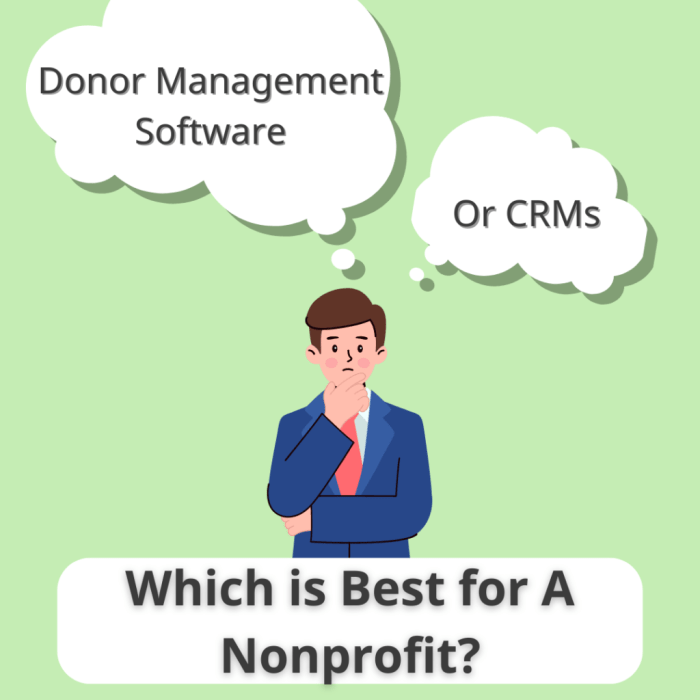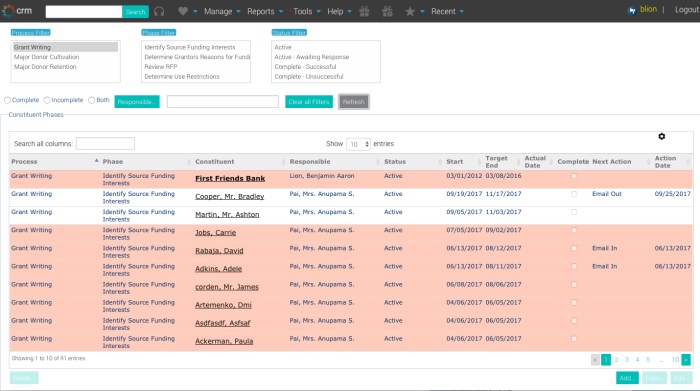Crm donor management software – In the dynamic landscape of nonprofit organizations, effectively managing donor relationships is paramount for sustained growth and impactful mission delivery. Donor management software (DMS), often categorized under the broader umbrella of Customer Relationship Management (CRM) systems, provides the tools and infrastructure to streamline this crucial process. This comprehensive guide delves into the intricacies of donor management software, exploring its features, benefits, selection criteria, and implementation best practices.
We will also address frequently asked questions and provide valuable resources to aid your organization’s decision-making process.
Understanding Donor Management Software (DMS)
Donor management software is a specialized type of CRM designed to centralize and manage all aspects of donor interactions. Unlike generic CRM solutions, DMS offers features tailored to the unique needs of nonprofits, such as tracking donations, managing fundraising campaigns, automating communications, and analyzing donor engagement data. This allows organizations to cultivate stronger relationships with donors, improve fundraising efficiency, and ultimately achieve greater impact.
Key Features of Effective Donor Management Software:, Crm donor management software
- Donor Database Management: Centralized storage of comprehensive donor information including contact details, donation history, communication preferences, and volunteer activities. This ensures a 360-degree view of each donor.
- Fundraising Campaign Management: Tools to plan, execute, and track fundraising campaigns, from online appeals to major gift solicitations. This includes features for managing pledges, grants, and in-kind donations.
- Donation Processing and Reporting: Seamless integration with payment gateways for online donations and automated generation of donation receipts and reports for tax purposes. Real-time reporting capabilities provide valuable insights into fundraising performance.
- Communication Automation: Automated email marketing, personalized thank-you notes, and targeted fundraising appeals based on donor segmentation and behavior. This enhances donor engagement and strengthens relationships.
- Volunteer Management: Features to recruit, manage, and track volunteer activities, recognizing their valuable contribution to the organization’s mission.
- Reporting and Analytics: Comprehensive reporting tools to analyze donor giving patterns, campaign effectiveness, and overall fundraising performance. Data-driven insights inform strategic decision-making.
- Integration Capabilities: Ability to integrate with other essential systems such as accounting software, email marketing platforms, and website donation forms for a streamlined workflow.
- Security and Data Privacy: Robust security measures to protect sensitive donor data and ensure compliance with data privacy regulations like GDPR and CCPA.
Benefits of Implementing Donor Management Software
Implementing a robust DMS offers numerous benefits to nonprofit organizations, significantly impacting their fundraising efforts and operational efficiency. These advantages include:
- Improved Donor Relationships: Personalized communication and targeted outreach strengthen donor relationships, fostering loyalty and increasing lifetime giving.
- Increased Fundraising Efficiency: Streamlined processes and automated tasks free up staff time, allowing them to focus on strategic initiatives and donor cultivation.
- Enhanced Data-Driven Decision Making: Comprehensive reporting and analytics provide valuable insights into donor behavior, enabling data-driven strategies for improved fundraising outcomes.
- Improved Operational Efficiency: Centralized data management eliminates data silos and streamlines administrative tasks, improving overall operational efficiency.
- Better Compliance and Transparency: Accurate record-keeping and automated reporting ensure compliance with regulatory requirements and enhance transparency.
- Scalability and Growth: DMS can adapt to the changing needs of a growing organization, providing a scalable solution for managing increasing donor data and fundraising activities.
Choosing the Right Donor Management Software
Selecting the appropriate DMS requires careful consideration of your organization’s specific needs and resources. Key factors to consider include:

Source: donorwrangler.com
- Size and complexity of your donor base: Choose a system that can handle your current and projected donor volume.
- Budgetary constraints: DMS solutions range in price, so selecting one that aligns with your budget is crucial.
- Required features and functionalities: Prioritize the features that are essential for your organization’s operations and fundraising strategies.
- Ease of use and user-friendliness: Select a system that is intuitive and easy for your staff to learn and use.
- Integration capabilities: Ensure compatibility with other essential systems used by your organization.
- Customer support and training: Choose a vendor that offers reliable customer support and comprehensive training resources.
- Scalability and future needs: Select a system that can adapt to the changing needs of your organization as it grows.
Implementing and Maintaining Your DMS
Successful DMS implementation requires careful planning and execution. Key steps include:
- Data Migration: Accurately transferring existing donor data to the new system is crucial. This process often requires professional assistance.
- Staff Training: Providing comprehensive training to staff on using the new system ensures efficient adoption and utilization.
- System Customization: Tailoring the system to meet your organization’s specific needs enhances its effectiveness.
- Ongoing Maintenance and Updates: Regular maintenance and software updates are crucial for optimal performance and security.
Frequently Asked Questions (FAQ): Crm Donor Management Software
- Q: What is the cost of donor management software? A: Costs vary widely depending on the features, scalability, and vendor. Expect to pay anywhere from a few hundred dollars per month to several thousand dollars annually.
- Q: How long does it take to implement donor management software? A: Implementation time depends on the size of your organization and the complexity of the system. It can range from a few weeks to several months.
- Q: What are the best practices for data security in donor management software? A: Employ strong passwords, multi-factor authentication, regular data backups, and adherence to data privacy regulations (GDPR, CCPA).
- Q: Can I integrate my donor management software with my accounting software? A: Yes, many DMS solutions offer integration capabilities with popular accounting software packages.
- Q: How do I choose the right donor management software for my nonprofit? A: Consider your budget, donor base size, required features, ease of use, and integration capabilities. Research different vendors and compare their offerings.
Resources
For further information and research, consider exploring these reputable resources:
- TechSoup : Provides technology resources and support for nonprofits.
- GuideStar : Offers information on nonprofit organizations.
- (Add other relevant links here)
Call to Action
Investing in the right donor management software is a strategic move that can significantly enhance your nonprofit’s fundraising efforts and operational efficiency. Start exploring different solutions today and take the first step towards building stronger relationships with your donors and achieving greater impact. Contact us to learn more about how we can assist you in selecting and implementing the perfect DMS for your organization.
Questions and Answers
What are the key features of a good CRM donor management software?
Key features include contact management, donation tracking, communication tools (email marketing, etc.), reporting and analytics, and ideally, integration with other fundraising platforms.
How much does CRM donor management software cost?
Pricing varies widely depending on the features, scalability, and vendor. Expect a range from free (limited functionality) to thousands of dollars annually for enterprise-level solutions.

Source: db-excel.com
Is CRM donor management software difficult to use?
Many systems are designed with user-friendliness in mind. However, the learning curve can vary, and adequate training is often necessary for optimal use.
Can CRM donor management software integrate with my existing systems?
Many CRMs offer integrations with various platforms, but compatibility should be a key consideration during the selection process. Check for APIs and pre-built integrations.
